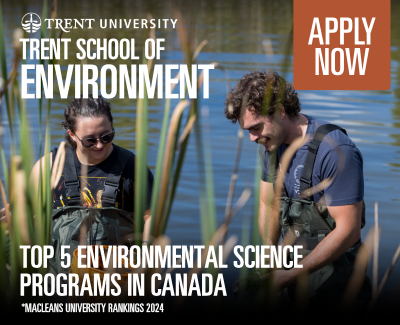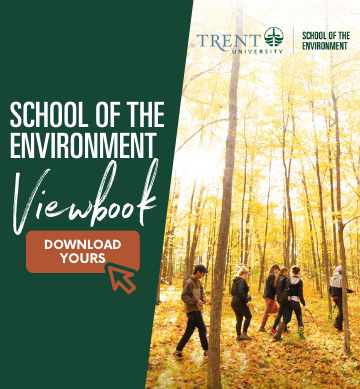Informally meet colleagues, professors, and guest speakers; learn about ongoing research and issues related to the environment
Free and open to all members of the Trent community and the public
Friday October 3rd, 3:00-4:00pm, CCN M2
Ian Power, Trent University
Geochemical CO2 removal for climate change mitigation: From HQP to HQP
Carbon dioxide removal (CDR) technologies are crucial for offsetting hard-to-abate greenhouse gas emissions and mitigating climate change. The weathering of alkaline rocks and minerals is one means by which the Earth naturally removes CO2 from the atmosphere, and forms the basis of many geochemical CDR approaches, including enhanced weathering of mineral wastes at mines and carbonation of oxide and hydroxide minerals in engineered systems. In this presentation, we’ll explore the potential for CO2 sequestration within mine wastes using diamond mines in South Africa and Canada as examples. Second, we’ll delve into the processes, mechanisms, and limitations in the carbonation of highly reactive oxide and hydroxide minerals that are being used in direct air capture technologies. The tremendous research contributions of many highly qualified personnel (HQP) from the PowerGeolab will be showcased.
Ian Power is an Associate Professor and Canada Research Chair in Environmental Geoscience in the Trent School of the Environment (PowerGeolab.com). Power’s team carries out laboratory and field experiments, as well as geochemical modelling, to understand mineral-water-CO2 interactions in natural and mining environments for geochemical CO2 removal. His research achievements include elucidating microbial and enzyme-mediated carbonation, CO2 mineralization within mine wastes, natural analogues and magnesium carbonate formation processes, as well as advances in enhanced rock weathering.
Friday, November 7th, 3:00-4:00pm, CCN M2
Cameron Proctor, UWindsor
Uncovering the Hidden Half: How do Plant Roots in Agriculture Vary Over Space and Time?
Approximately 40-60% of plant assimilated carbon is deposited belowground to maintain and growth the root systems of plants. These roots respond strongly to gradients in limiting resources such as water, nitrogen, and phosphorous which can have profound effects on biogeochemical cycles and the carbon sequestration potential of soil. In agricultural contexts, where farmer economic and environmental outcomes depend on how well they deliver these resources to the roots, root plasticity is a real challenge as where the roots are in the soil changes year to year. Despite the need to understand the controls on the hidden half of plants, Canada's belowground monitoring infrastructure is extremely limited, especially considering the diversity of our crops and production regions. Cost, logistics, and durability are commonly cited barriers. However, next-generation minirhizotron technology may overcome these challenges to become a wide-spread tool, empower on-the-ground decision making and strategic research on crop varieties that are more resilient, need fewer resources, and are better adapted to future climates. This talk will discuss the arc of progression in minirhizotron technology and results from field trails monitoring sugarbeet disease progression.
Dr. Cameron Proctor is an Assistant Professor in the School of the Environment at the University of Windsor and is an executive member of the AgUWin research center. He is a remote sensing scientist who focuses on individual plant imaging from above (e.g., satellites, drones) and below (minirhizotrons) to understand how plants choose to allocate their limited resources, root system responses to stressors, and the role of root-soil-microbial interactions in carbon and nutrient cycles. His research program aims to commercialize new tools to image belowground processes that have never been monitored before. Unlocking the ability of scientists, farmers, and industry to observe root system dynamics in-situ in agriculture, forestry, savanna, and Arctic ecosystems and address some of the most pressing gaps in ecosystem management.
Friday, November 28th, 3:00-4:00pm, CCN M2
Andrew M. Gordon, Ph.D., R.P.F.; Prof. Emeritus, University of Guelph; Director, U-Links Centre for Community-Based Research, Haliburton County
Agroforestry Systems for Southern Ontario: Providing Environmental and Economic Goods and Services
Andrew M. Gordon – Biography - 2025
Friday, January 16th, 3:00-4:00pm CCN M2
Amanda Stubbs, UNDO Carbon
From Academia to Industry Action: A Career in Enhanced Rock Weathering and the Pathway to Carbon Credits
Amanda, a Trent University alumna, will share her educational journey from studying at Trent to earning her PhD in Earth Sciences at the University of Glasgow. She will also reflect on her unique experience representing Canada within the Commonwealth, stemming from her work advancing carbon dioxide removal research and advocating for climate science.
After transitioning from academia to industry, Amanda now works as a Senior Research Scientist at UNDO. In this talk, she will introduce enhanced rock weathering as a climate solution, discuss its potential across Canada, particularly in Ontario, and explain how companies measure, report, and verify carbon removal to earn carbon credits for removing carbon dioxide from the atmosphere.
Amanda Stubbs is a Senior Research Scientist at UNDO Carbon, an enhanced rock weathering company. She earned her PhD in Earth Sciences from the University of Glasgow in 2025, where her research focused on the carbon removal potential of rock-based technologies using locally available materials in Scotland. She previously completed her BSc in Geography (2018) and MSc in Environmental and Life Sciences (2020) at Trent University. Now based in Canada, Amanda leads academic collaborations at UNDO and supports the development and implementation of monitoring, reporting, and verification frameworks for verified carbon credits.
Friday, February 6th, 10:00-11:00 am (EST)
https://trentu.zoom.us/j/93833376448?pwd=z3jvmmX1dnmk9eYM6aRZpPHuXQXuTN.1
Prof. Mazin Qumsiyeh, Bethlehem University
Environmental destruction versus environmental justice and sustainability: Case study in Palestine
Friday March 6th, 3:00-4:00pm
Tapan Dhar, Trent University
Talk Details - TBA
Friday March 27th, 3:00-4:00pm
Speaker - TBA
Talk Details - TBA




